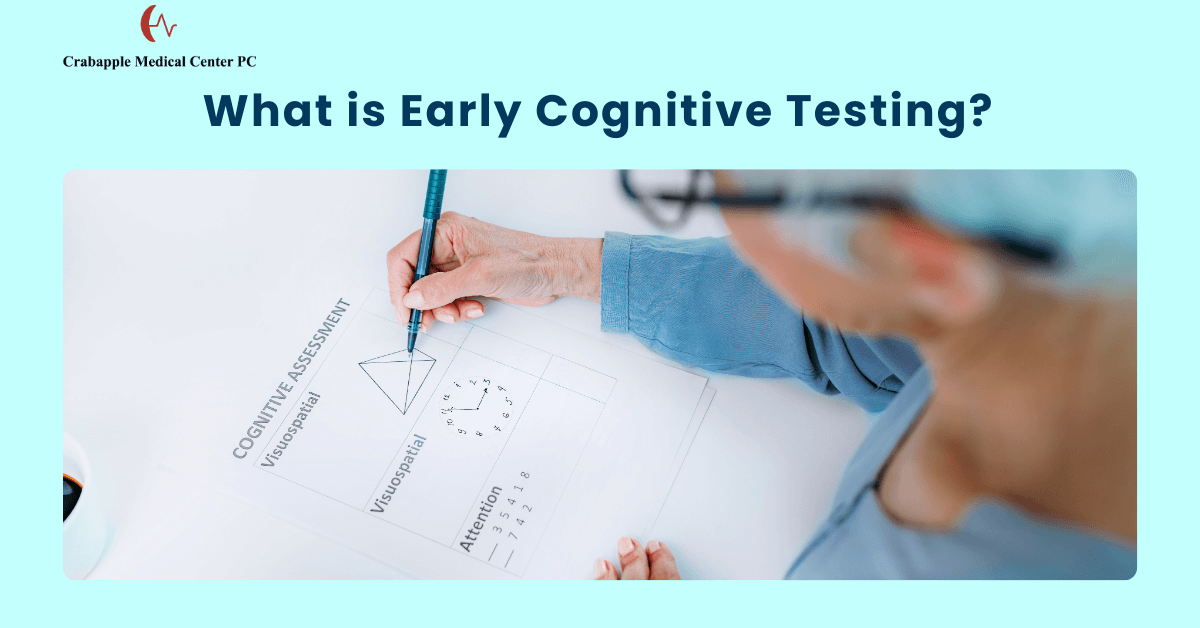Aging brings about many changes in the body, and one of the most important aspects of this transition is maintaining mental health. Cognitive decline, though common with aging, doesn’t have to be inevitable. By taking a proactive approach through early cognitive testing, individuals can better protect their mental health as they age, identify early signs of cognitive disorders, and take the necessary steps for improvement.
At Crabapple Medical Center in Alpharetta GA, we believe that mental health is as crucial as physical health, and we provide comprehensive geriatric care, including early cognitive testing, to ensure that older adults remain healthy, active, and mentally sharp throughout their later years. In this blog, we will explore the importance of early cognitive testing, its benefits, how it can improve quality of life, and how Crabapple Medical Center is helping individuals manage their mental health as they age.
Understanding Cognitive Health and Its Importance in Aging
Cognitive health refers to the ability to think, learn, and remember. As we age, the risk of cognitive decline increases, and it’s important to differentiate between normal age-related changes and more serious conditions such as dementia and Alzheimer’s disease. Cognitive decline can be subtle at first, and it may not always be clear whether the symptoms are part of the natural aging process or a sign of a more serious problem.
Cognitive decline in older adults can manifest in many ways, such as:
- Difficulty recalling names or recent conversations
- Trouble following directions or keeping track of appointments
- Misplacing items more often
- Reduced ability to focus or multitask
- Changes in mood, behaviour, and personality
While some level of forgetfulness is a normal part of aging, significant or persistent cognitive issues may be a sign of a more serious condition, such as Alzheimer’s or other forms of dementia.

What is Early Cognitive Testing?
Early cognitive testing is a method of assessing the cognitive function of an individual, typically through a series of structured tests or questionnaires. These tests are designed to detect even subtle changes in memory, thinking, and reasoning that could indicate the onset of cognitive decline or a potential cognitive disorder. Early cognitive testing helps healthcare providers identify problems before they worsen and enables them to recommend effective treatments, lifestyle adjustments, and interventions.
At Crabapple Medical Center, early cognitive testing is an essential part of our geriatric care program. We use evidence-based tools and assessments to evaluate cognitive function, and we provide our patients with a comprehensive care plan to address any cognitive health concerns they may have.
Why is Early Cognitive Testing Important?
Early cognitive testing plays a vital role in protecting mental health as individuals age. Detecting cognitive changes early on provides many benefits:
1. Early Detection of Cognitive Decline
Many cognitive issues, especially those linked to Alzheimer’s disease or dementia, develop gradually. Early cognitive testing allows healthcare providers to catch signs of decline early, even before significant symptoms appear. Early intervention can slow the progression of cognitive decline and improve long-term outcomes.
2. Personalized Treatment Plans
Cognitive testing helps create personalized treatment plans. If any cognitive decline is detected, we can develop a care plan that might include medication, lifestyle changes, therapy, or referrals to specialists. Early detection ensures that the right treatment is started as soon as possible, which can significantly improve quality of life.
3. Monitoring Changes Over Time
Cognitive testing also provides a baseline for future testing. If an individual has been tested and a baseline has been established, subsequent tests can track changes over time. This ongoing monitoring allows healthcare providers to adjust care plans accordingly and provide timely interventions as the person’s needs change.

4. Peace of Mind
For individuals and their families, early cognitive testing offers peace of mind. Understanding where cognitive health stands can alleviate concerns and reduce anxiety about future declines. It helps individuals make informed decisions about their health and future care needs.
Process of Early Cognitive Testing
Early cognitive testing involves several steps, including a combination of standardized assessments, discussions, and physical evaluations. These assessments are designed to evaluate various cognitive functions, including memory, language, problem-solving, attention, and reasoning.
Common Cognitive Testing Tools:
1. Mini-Cog
The Mini-Cog is a simple screening tool that combines a three-item recall test with a clock-drawing task. It is quick and effective in assessing memory and executive function, which is important for detecting early cognitive changes.
2. Montreal Cognitive Assessment (MoCA)
The MoCA is a more comprehensive cognitive screening tool that evaluates multiple cognitive domains such as memory, attention, language, and executive function. This test is widely used in clinical settings and provides valuable insights into cognitive health.
3. Mini-Mental State Examination (MMSE)
The MMSE is one of the most used cognitive assessment tools. It evaluates areas such as orientation, attention, memory, and language abilities. The MMSE is widely recognized and used to assess cognitive impairment and track its progression over time.
4. Clock Drawing Test
This test involves asking the individual to draw a clock with the hands set to a specific time. It assesses spatial awareness, executive function, and motor skills. It is commonly used to detect early signs of cognitive decline.
5. Neuropsychological Testing
Neuropsychological testing is a comprehensive battery of tests administered by a neuropsychologist. It evaluates various cognitive functions in more detail, providing a clearer picture of cognitive health and identifying specific areas of concern.
At Crabapple Medical Center, we utilize a combination of these tools and assessments to create an accurate evaluation of cognitive function. Our healthcare providers take the time to ensure that every patient receives a thorough assessment to better understand their mental health.
Take Control of Your Cognitive Health
Reach out to Crabapple Medical Center for expert cognitive testing and personalized care plans designed to protect your mental well-being.

Lifestyle Factors Affecting Cognitive Health
In addition to early cognitive testing, lifestyle factors play a significant role in maintaining and improving cognitive health. Several modifiable habits can help support cognitive function and protect against cognitive decline:
1. Physical Activity
Regular physical exercise has been shown to improve blood flow to the brain, stimulate the growth of new brain cells, and enhance cognitive function. Activities such as walking, swimming, or strength training can significantly benefit cognitive health, especially in older adults.
2. Nutrition
A healthy, balanced diet is crucial for brain health. Nutrients like omega-3 fatty acids, antioxidants, vitamins, and minerals support cognitive function. Foods like leafy greens, berries, nuts, and fish are rich in nutrients that promote brain health. At Crabapple Medical Center, we provide dietary recommendations to help our patients support their cognitive health through nutrition.
3. Mental Stimulation
Engaging in activities that challenge the brain, such as puzzles, reading, or learning new skills, can enhance cognitive reserve. Cognitive reserve refers to the brain’s ability to cope with damage or age-related changes. The more actively the brain is engaged, the better it can compensate for cognitive decline.
4. Social Engagement
Social isolation can increase the risk of cognitive decline. Maintaining strong social connections and participating in social activities helps keep the brain active and reduces the risk of depression and loneliness, both of which can negatively impact cognitive health.
5. Sleep
Getting enough quality sleep is essential for cognitive function. Sleep helps consolidate memories and clear toxins from the brain. Poor sleep habits can increase the risk of cognitive decline, so prioritizing sleep is vital for mental well-being.
6. Stress Management
Chronic stress can have detrimental effects on the brain, particularly the hippocampus, which is responsible for memory. Learning stress-reduction techniques like meditation, deep breathing, or mindfulness can help protect the brain and reduce the risk of cognitive decline.
Role of Crabapple Medical Center in Cognitive Health
At Crabapple Medical Center, we provide comprehensive geriatric care to support our patients’ cognitive health throughout aging. Our team of healthcare professionals is trained in early cognitive testing and is dedicated to helping individuals navigate the challenges of aging with a focus on mental health.
1. Comprehensive Cognitive Assessments
Our healthcare providers offer thorough cognitive testing using proven tools like the MoCA, MMSE, and Mini-Cog. These assessments help us understand each patient’s cognitive function and guide us in creating tailored care plans.
2. Personalized Care Plans
Based on cognitive assessments and health histories, we develop personalized care plans for each patient. These plans may include medications, lifestyle modifications, cognitive therapy, or referrals to specialists.
3. Ongoing Monitoring
We monitor cognitive health over time, ensuring that our patients’ treatment plans remain effective and adjusting them as needed. This ongoing care helps detect early changes and ensure the best outcomes for our patients.
4. Emotional and Psychological Support
Cognitive decline can be emotionally challenging. At Crabapple Medical Center, we offer counselling and mental health support to help our patients cope with the emotional aspects of aging and cognitive decline.
5. Collaboration with Specialists
When necessary, we work closely with specialists in neurology, psychiatry, and other fields to provide comprehensive care for patients with more advanced cognitive issues. Our goal is to ensure that our patients receive the best possible care, no matter their cognitive health challenges.
Protect Your Cognitive Health with Crabapple Medical Center
Early cognitive testing is essential for maintaining mental health and preventing serious cognitive decline as we age. By identifying cognitive issues early, healthcare providers can implement effective interventions that can significantly improve the quality of life for older adults.
At Crabapple Medical Center in Alpharetta GA, we are committed to providing comprehensive geriatric care, including early cognitive testing, personalized treatment plans, and emotional support. Our team works closely with patients to ensure they receive the care they need to maintain cognitive health as they age.
If you or a loved one is concerned about cognitive health or experiencing symptoms of cognitive decline, we encourage you to contact Crabapple Medical Center in Alpharetta GA. Our team is here to provide expert guidance, support, and care to help protect your mental health as you age.
Protect Your Mind, Improve Your Life
Let Crabapple Medical Center guide you through maintaining cognitive health with early testing, support, and proactive care.
Frequently Asked Questions
What is early cognitive testing, and why should I consider it?
Early cognitive testing is a series of assessments designed to detect early signs of cognitive decline, memory loss, or other cognitive issues. It’s important because it helps catch problems early, allowing for timely interventions and better management of mental health as you age. At Crabapple Medical Center, we offer thorough cognitive evaluations to ensure your mental health is on track.
What are the common signs that I may need early cognitive testing?
Some common signs that may indicate the need for early cognitive testing include forgetfulness, difficulty remembering appointments or conversations, trouble solving problems or following instructions, and changes in mood or behaviour. If you notice these symptoms, it’s a good idea to talk to a healthcare provider at Crabapple Medical Center about testing.
Is cognitive decline a normal part of aging?
Some cognitive changes, like occasional forgetfulness, are a normal part of aging. However, significant cognitive decline or memory loss is not inevitable and may be a sign of a more serious condition, such as dementia or Alzheimer’s disease. Early cognitive testing at Crabapple Medical Center can help differentiate between normal age-related changes and more serious cognitive issues.
How can I protect my cognitive health as I age?
There are several steps you can take to protect your cognitive health, including maintaining an active lifestyle with regular physical exercise, eating a balanced diet, staying socially engaged, and challenging your brain with mental activities. At Crabapple Medical Center, we offer guidance and personalized plans to help support your cognitive health as you age.
What happens if early cognitive testing detects signs of cognitive decline?
If cognitive decline is detected, Crabapple Medical Center will work with you to develop a personalized care plan. This may include lifestyle recommendations, medications, cognitive therapy, or referrals to specialists. Early detection allows for more effective management of symptoms and helps slow the progression of cognitive decline.

